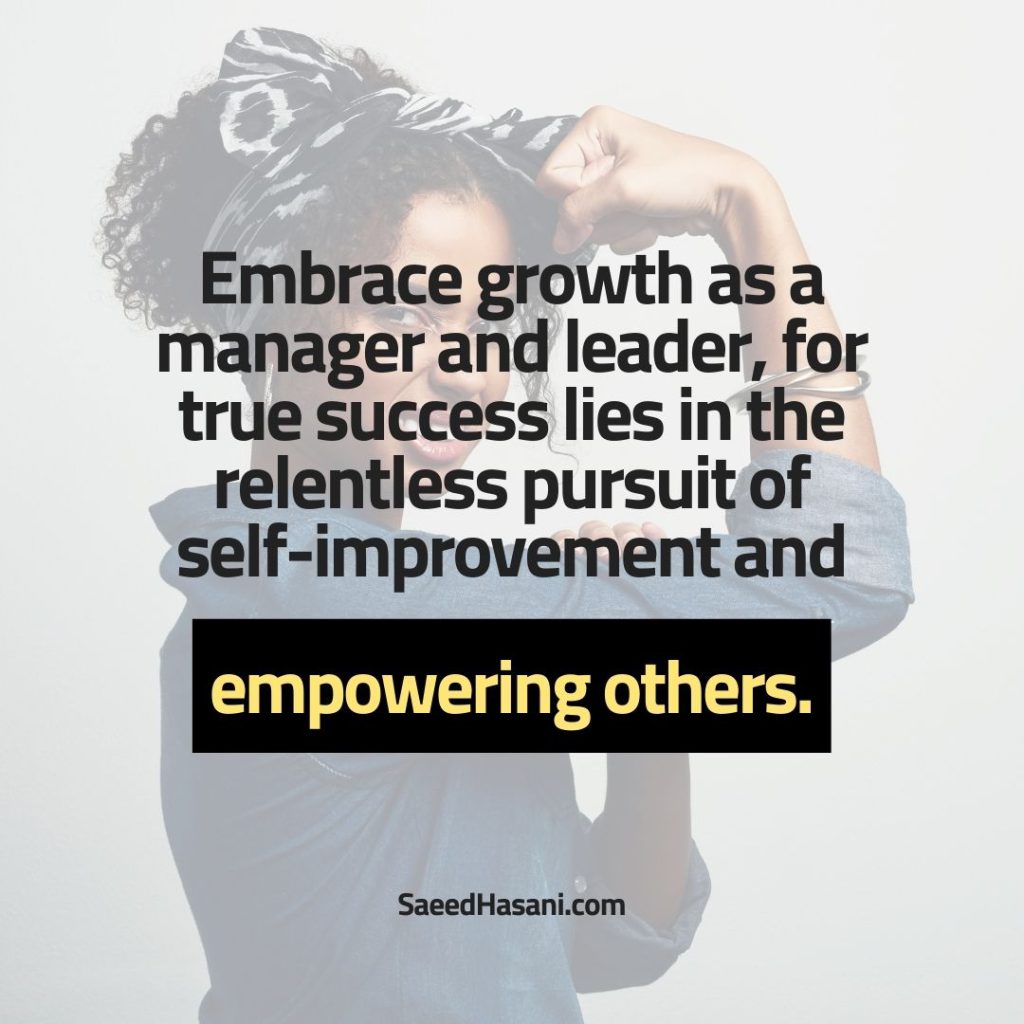How to be a good manager and leader? | Key Insights for Success

Becoming a skilled and effective manager and leader is achieved with continuous follow-up. You need to master a variety of skills and learn about a variety of strategies. Do not deny the importance of mastering the art of communication and cultivating empathy. You will benefit from favorable growth opportunities by improving your decision-making skills and supporting innovation. Please read this article carefully as we provide useful information about effective leadership and introduce you to the basic principles in this field.
Becoming a better manager and leader
Becoming a more effective manager and leader is an ongoing endeavor that requires honing a diverse range of skills, qualities, and behaviors. To unlock your full managerial and leadership potential, consider focusing on the following key aspects:
1. Mastering Communication:
The cornerstone of successful leadership is effective communication. Cultivate active listening, articulate your thoughts clearly, and foster open dialogues. Approachability is vital, encouraging team members to express their opinions and concerns freely.
2. Cultivating Empathy and Emotional Intelligence:
Forge personal connections with your team by understanding their individual experiences. Acknowledge their emotions, needs, and viewpoints. This empathetic approach nurtures trust and cultivates a positive work atmosphere.
3. Skillful Delegation:
Harness the power of delegation by assigning tasks based on team members’ strengths and expertise. Avoid micromanagement, empowering your team while providing necessary guidance.
4. Navigating Conflict:
Address conflicts diplomatically and promptly. Strive for solutions that benefit all parties, fostering productive discussions that sustain a harmonious team environment.
5. Sharpening Decision-Making Abilities:
Refine your decision-making skills by gathering pertinent information, analyzing options, anticipating outcomes, and making well-informed choices. Embrace decisiveness and be open to calculated risks.
6. Embracing Adaptability:
Given the ever-evolving business landscape, welcome novel concepts, technologies, and strategies. Adjust your leadership style to suit different circumstances and challenges.
7. Articulating Vision and Strategy:
Communicate both the team’s objectives and the broader organizational vision. Construct a strategic roadmap to attain these goals and effectively convey them to your team.
8. Providing Feedback and Coaching:
Regularly offer constructive feedback to your team members. Extend guidance and mentorship to foster their growth and skill development within the organization.
9. Excelling in Time Management:
Effectively manage your time by prioritizing tasks and setting realistic deadlines. That showcases your commitment to productivity, motivating your team to follow suit.
10. Building Cohesive Teams:
Cultivate a collaborative and inclusive team environment. Encourage cross-functional collaboration and create opportunities for skill-sharing and team bonding.
11. Lifelong Learning:
Stay current with industry trends, leadership best practices, and innovative management approaches. Attend workshops, delve into pertinent literature, and actively pursue professional development opportunities.
12. Leading through Example:
Exemplify the conduct, work ethic, and attitude you expect from your team members. Your actions resonate more powerfully than words, motivating your team to follow your lead.
13. Developing Resilience:
Leadership is not without its challenges. Foster resilience to navigate setbacks, draw lessons from failures, and persevere when faced with adversity.
14. Upholding Ethical Leadership:
Guide with integrity and adhere to ethical standards. Your behavior shapes the organizational culture of the entire team.
15. Recognizing and Commending:
Celebrate your team members’ contributions and successes. This acknowledgement elevates morale and motivation, nurturing a positive team spirit.
Remember, the journey toward becoming a better manager and leader is continuous. Regular self-assessment, seeking feedback, and embracing personal growth are fundamental aspects of this voyage. Tailor your approach to suit your team’s and organization’s unique requirements while staying true to your authentic leadership style.

How to be an effective manager and leader?
Evolving into an adept manager and leader necessitates a blend of skills, attributes, and tactics that empower your team and foster positive results. Here’s a comprehensive guide to assist you on this transformative journey:
Cultivate Self-Awareness:
Comprehend your strengths, limitations, values, and distinctive leadership style. Utilize self-awareness to harness strengths and refine areas requiring growth.
Promote Clear Communication:
Flourishing leadership hinges on effective communication. Embrace openness, transparency, and attentive listening. Nurture candid dialogues and ensure your messages resonate with your team.
Forge Meaningful Connections:
Forge formidable bonds with team members. Comprehend their needs, motivations, and aspirations. Establishing trust and rapport cultivates fertile ground for productivity and harmony.
Define Crystal-Clear Expectations:
Delineate roles, duties, and objectives for your team. Assure all comprehend their responsibilities and how their contributions align with the overarching goals.
Delegate Intelligently:
Assign tasks based on team members’ proficiencies and capabilities. Empower your team by entrusting them with ownership while offering guidance and support when needed.
Deliver Constructive Feedback:
Regularly provide feedback to catalyze team growth. Highlight strengths and propose improvements constructively and optimistically.
Empower and Cultivate Development:
Invest in your team’s professional growth. Present learning opportunities, mentorship, and resources to elevate skills and foster career advancement.
Exemplify Leading by Example:
Epitomize the demeanor, work ethic, and attitude you anticipate from your team. Your actions wield substantial influence on the team’s ethos and performance.
Solve Challenges and Make Decisions:
Address obstacles proactively and collaboratively. Incorporate your team in decision-making and problem-solving to nurture engagement and ownership.
Navigate Conflict Adroitly:
Handle conflicts with professionalism and respect. Mediate as required, focusing on mutually beneficial solutions.
Champion Innovation and Adaptation:
Cherish change and inspire innovation. Embrace fresh concepts, technologies, and methods that augment team efficiency and accomplishments.
Cultivate a Positive Workspace:
Cultivate a corporate culture that prizes diversity, inclusivity, and positivity. Foster teamwork, recognition, and a healthy work-life equilibrium.
Harmonize Time Management:
Effectively manage time by prioritizing and organizing tasks. An orderly manager sets a tone for team productivity.
Monitor Progress Diligently:
Regularly evaluate your team’s strides toward goals. Celebrate victories and tweak strategies as required to sustain continuous improvement.
Lead Amidst Challenges:
Remain composed in crises. Extend guidance, assurance, and direction to your team.
Champion Ethical Leadership:
Exemplify ethical conduct and decisions. Set a model of integrity and accountability.
Acknowledge and Reward:
Commend your team’s triumphs and diligent work. Acknowledging efforts uplifts morale and motivation.
Commit to Continuous Learning:
Stay abreast of industry trends, premier leadership practices, and novel management methodologies. Strive for personal and professional evolution.
Cultivate Resilience:
Leadership accompanies challenges. Foster resilience to maneuver setbacks while preserving a constructive outlook, motivating your team.
Solicit Feedback:
Regularly seek input from team members and peers. Continuous improvement is fueled by understanding avenues to augment your leadership.
Remember, metamorphosing into an adept manager and leader is an ongoing expedition that demands dedication and introspection. Adapt your strategy to accommodate your team’s and organization’s requisites, all while embracing perpetual learning and enhancement in your role.

Conclusion
Following a continuous and dynamic path is necessary to become an effective manager and leader. This path involves a multifaceted combination of skills, qualities, and strategies. From mastering communication and fostering empathy to making strategic decisions and fostering innovation, all of these things will help you as a leader to win on the road to success.
As you cultivate self-awareness, build relationships, and exemplify ethical standards, remember that your journey isn’t just about reaching your destination; it’s about constantly evolving and adapting to the needs of your team and organization. By embracing lifelong learning and maintaining a commitment to growth, you can lead your team to success while staying true to your authentic leadership style. Through dedication, self-reflection, and implementation of these principles, you will be recognized as an effective and positive manager and leader.







Responses